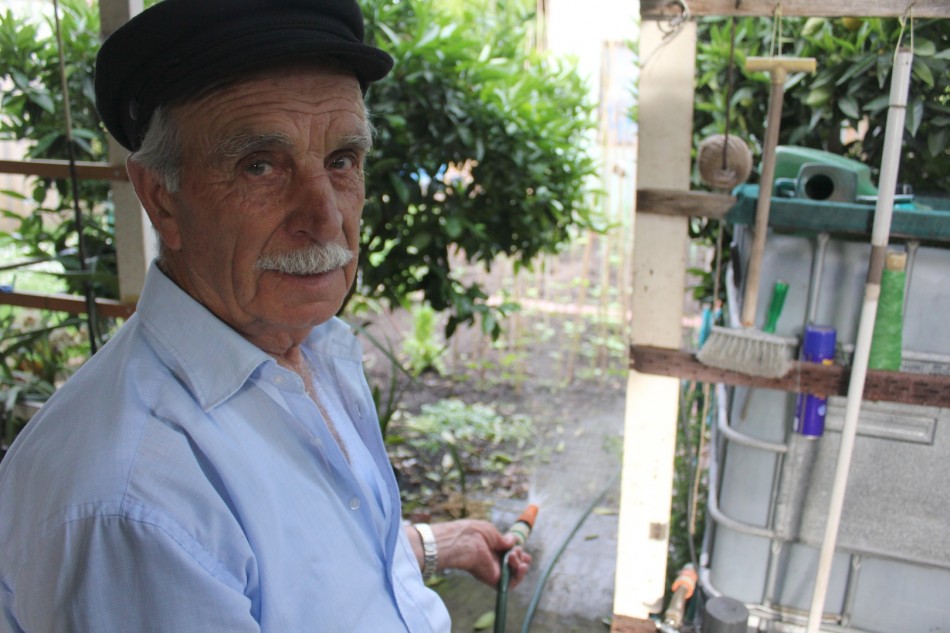Tom Andronas Producer – video | radio | print | photo+61 412 371 466
tomandronas(at)gmail.com
“Taste the sun” – Neos Kosmos
 Michael Sfikas showing off his home-made tank and hose setup. PHOTO: Thomas Andronas.
Michael Sfikas showing off his home-made tank and hose setup. PHOTO: Thomas Andronas.
26 November 2011
THOMAS ANDRONAS
Every spring since I can remember, my pappou’s planted a vegetable patch.
He plants cucumbers, beans, lettuces, artichokes and countless other fruits and vegetables. But it’s his tomatoes that are his pride and joy.
He approaches them with the skill of a silversmith, and the nonchalant attitude of an old hand. He’s planted and reaped these fruits for longer than he can remember.
“If I plant them all at the same time they’ll all be ready at the same time, and I’ll end up throwing them away,” he says through his thick silver moustache.
“So that they ripen one after the other I plant them in stages, intentionally so that they ripen at different times, not all together.”
Firm logic, but something tried and tested across decades.
“Now is planting time, through to the end of November,” he says.
“They take 3 to 4 months before they’re ready for harvest. You have to be patient, you can’t force them to grow.”
Michael Sfikas migrated to Australia from Greece in 1964, with his wife and two children. Every spring since then, he’s planted. He’s now 86 years old, with the sun-withered skin to prove it.
“I do it because I’m still strong, and you should remember that too,” he tells me, with the air of an old man educating a young one.
“I do it because I can, I enjoy it, and I still have the strength. But it depends on the person, every person is born different from everyone else.”
“In Greece I worked in construction, as a carpenter, because I had it in me. You know who made this house, inside and out? I did,” he declares proudly.
“The thing is that I enjoy it, and I can, I’m still strong enough. Nothing’s happened to me yet.” Nor is it likely to, the old man is as stubborn as a mule.
However, despite his advanced years and more than half a century of habits, 13 years of drought forced Michael Sfikas to think ecologically. Today, he has 3000 litres of rainwater sitting in home-fashioned tanks in the corner of his yard.
“I put the tanks in three years ago so that I could water my plants without using tap water,” he says.
“There’s 3000 litres there, full. I never water with tap water any more. I’ve got a pump and everything.”
In all, there’s really nothing unusual about what my pappou does. It’s not uncommon in this city, in this country, to have a fully functioning vegetable patch in your back yard. Many other kids of my generation, who are from migrant backgrounds, will testify to this.
My grandparents are by no means self-sufficient, nor are they interested in buzzwords like ‘sustainability’, but planting a garden every spring gives them something to do, and it feeds them a little as well. It reminds them of the old country and it keeps their brains active. In many ways, it keeps them alive. And that’s why it’s special.
As the grandson of the man, it’s a privilege to have grown up eating fresh, home-grown produce. It’s something that most city-dwellers have never had the opportunity to do.
There’s nothing quite like a vibrant red, sun-drenched tomato plucked straight off the vine at exactly the right time, by a man who’s been doing it for 70 years. You can – and I do – taste the sun, and the love.
My pappou’s garden is an urban bounty fit for king, grown – in true fashion – by a commoner. Regardless, that’s when he’s happiest, when he’s pottering around in his garden.
From my perspective, as a child I ate so many garden-fresh cucumbers that one time I threw up from the sheer volume. I loved it. My sister still does. If nothing else, our pappou’s legacy will be my sister’s insatiable appetite for salad.
Our fondest childhood memories are those moments we spent chomping down on pappou’s juicy, fresh-picked, odd-looking tomatoes.
But at the end of the day, Michael Sfikas reads a lot less into his tomatoes than I do.
“My tomatoes are good, they’re healthy, and they taste great,” he says.
“They’re a bit of a pain, but I enjoy it. This i my job, it’s how I was born.”